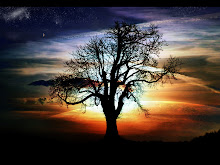Slender silvered fingers stirred the air, trailing streams of moonlight shimmering faintly with otherwordly argent. Glittering strands wove a simple pattern that unraveled too soon. A cloud drifted across the moon's face and the fingers faltered, stilled, dropped. The weaving faded. Her face shadowed with the moon, ice-blue eyes dulled, and her head nodded to her chest, too weak to hold.
Too little remained. She was alone and lost in this mortal world, and the bridge to her own had waned with the passing of her people. She had no way to return and nothing to which to return.
She had been so sure that she knew better than the Elders, so certain that the love she bore for a mortal man would survive the Waning, so convinced that she could thrive in a world made for other than her ilk. Foolish. Rash.
Doomed.
He had been young and beautiful, the mortal man who had stumbled through their weavings and across the Bridge, protected by his innocence and the pendant around his neck. A gift offered out of selfless love, it was, and bound about with the rites and magics of the Sacrificed God. Her sentinels could not harm him and instead brought him before her for judgment.
His beauty was of a sort that did not exist in her world. His skin was dusky, his hair the shade of wood from other forests than hers. His eyes also shone darkly, but the color did not fill the orbs between his lids as did hers, instead surrounded by ivory. They seemed more expressive than those of her kind, full of fear and curiosity mixed.
And he was young. Young, with a rushing warmth and vibrancy no longer found in her old, cold race. His was the quickness of the short-lived, those who grasped each day with hunger, for their days were few in number.
He did not see her many years, for hers was a people who did not show age. She could no longer remember the years of her youth, spent in a long ago. She had been the last child born to her people, the last of youth in a people waiting for the end. She, too, waited for the Waning, for the passing into rest.
He stirred her slow blood, this child-man. And his eyes on hers spoke of a stirring in his, a heat that spread molten through her veins until she gasped with the life of it.
He told her of his world, the lands his father held and where he had walked boldly into a forest feared by his people, out of a desire to find new challenge in a summer grown dull with peace. She motioned to the pendant around his neck, and he, out of desire to please his lovely hostess, tucked it in his pouch for safekeeping. They sat to dinner, and no wine poured could match the sweetness of their gazes upon one another.
He warmed her bed that night, and the night after that, and those following: nights that passed with a speed that dizzied her. A breath of his time had crossed the bridge with him, and the quickening was a liquor in her blood.
The Elders murmured in her ears, but she did not hear them. He was hers, and she was his.
Forever, she pledged to him, and Forever, he said in return. She wound a strand of hair about his finger where it twined and shimmered into silver and white gold. His braided hair about her finger showed no transformation, but she felt the weave of the troth nonetheless.
And the Elders spoke. The time had passed, the end was come, and the Waning was at hand. She must give him up, for where they were passing he could not go.
She was not ready. She no longer desired rest. Her blood roared through her veins as though she was young again. In his eyes, in his arms, she was young again. Since he could not come with her, she would go with him. She would cross back over the bridge with him, return with him to his lands and his people.
They will adore you as do I, he told her. How could they not?
So she did not Wane. At the last, before the bridge faded from their lands, they crossed over, hand in hand, their rings of hair and not-hair binding them. When the weavings vanished and the mists parted, she stood in the light of the mortal sun.
The molten orb was young and seared her with its glare. She gasped, the very air flaming in lungs long accustomed to the silken touch of ancient light. Her steps faltered, her slender form wilting like a delicate bloom thrust too near the flame. He barely glanced at her, eager steps racing back to the home for which he yearned. She stumbled in his wake. She clutched at his fingers in sudden and unaccustomed fear, and he finally slowed.
He turned, a half spoken word of vexation on his tongue. His impatience turned to concern when he saw her face, and he clasped her close just before her knees gave way.
His people had given him up for lost years before. Time had passed strangely in the other world, he found, and for each sennight spent in her soft bed a year had passed for his loved ones. They were grown a little older, a little greyer, a little sadder without his sweet humor to cheer them. His father had fallen to a bandit raid just the year before, and they welcomed him as their lord.
His homecoming was joyous, tinged with wonder over the strange swooning bride he brought back from his travels. She was all silver and pearl, with great ice-blue eyes, no whites, fringed with frosted lashes longer than any they'd seen. Her hair was spun snow cascading over a form so slender they wondered how she stood in a wind. She was not of their world, and they whispered in corners over her alien beauty, his unaltered youth.
One woman alone welcomed the wintry maiden with no hesitation. Her chestnut braids were laced with white that had not been there last he saw her, but the love in her eyes was the same. She embraced her son's bride as she embraced her son, and her words sent servants scurrying to prepare a place for them to rest.
The white lady lay breathless and still for hours. Hesitant servants tended her, held cups of rich broth and sweet wine to her lips, bathed her brow. He sat by her side much of the day, then lay beside her as the relentless sun slipped below the horizon.
As the gentle moon rose full and round in the night sky, she stirred, then rose and moved to the window. She raised her face to the silvered light that spilled across the strange land outside. Her fingers moved, and soft weavings glimmered a moment, then faded.
He slept all the moonlit hours she stood looking out, and finally she crept back to his side as the sky grew rosy with approaching dawn, clinging to him like a child lost. When the sun climbed again, driving the strength from her limbs and the breath from her lungs, he left her in the shadow of her curtained bed. He had lands to survey, people to reassure, a place to take hold.
That night she rose again with the moon, and once again he slept. The moonlight was a little less this night, the edge of the disk slightly blunted. Again her fingers wove faint patterns in the light, then stilled upon the window ledge. When she returned to his side, she flinched from a new burning. He woke at her gasp and looked down at his chest, where the pendant lay as it had before.
My mother asked where it had gone, he told her. I must wear it. It is our way.
She said nothing, and the cruel sun rose again, and she lay in silence.
Each day he rode out on his lands, and each night she stood with her face to the vanishing moon. Once, when his people had a great banquet to celebrate his return, she rose early and descended to the table on his arm. The bread was ashes in her mouth, the wine acid on her tongue. She sat silent and wan as he laughed with friends renewed, and after scant time she returned to the sanctuary of her room. The whispers grew to open comment, and even his mother bore faint lines upon her brow.
He came to her angry that night, affronted by the insult she had not meant. He grasped her narrow shoulder and spun her away from the window. She winced, but he did not notice the bruise already purpling on her skin. She stood silent and pale before his fury, and at last he left her. He did not sleep in her bed that night, or the night thereafter. When at last he returned to her, he found her at the window, gazing at a moon half in shadow.
They lay together that night, but she had little strength or passion in her limbs. When at last he slept, she slipped from the sheets and stood again in her moonlit place. Her face was streaked with tears.
He grew impatient in the days following. He came later and later to her bed, and finally not at all.
One night the moon did not rise, and neither did she. She lay in silent stupor in a room filled with shadows. His mother sat beside her day and night, urging broth and watered wine between her lips. He visited briefly, but was too busy to stay. She still breathed, though shallowly, as though she had not the strength to move her lungs more deeply.
As the moon grew in strength, so did she, though with only a fraction of what she once had. She asked for him, and after long hours he entered her room. His eyes held none of the warmth she sought. She grasped his hand, and her fingers found no ring bound about his.
I have been working the horses, he told her. I could not wear it. What is it you need, my lady? Are you lacking anything in care?
But she had no words, and after waiting a moment, he turned from her and left the room.
That night she went in search of him. She wandered halls in slow distraction, finally passing a door where she chanced to catch a hint of laughter. His laughter.
She placed one slender hand on the door, then opened it with what little strength she had in her. Flickering firelight illuminated a disheveled bed, sheets wrapped about gleaming limbs entwined. His head was bent to that of a woman whose raven hair cascaded across lush curves and golden skin. They moved in ancient rhythm, and his laughter turned to fervent gasps.
They never noticed her motionless form in the doorway, nor heard the door close when she slipped back into the hall.
She did not know how long she wandered until she found the main door, nor how she found the strength to open it and escape into the night. She stumbled across the unfamiliar landscape, her eyes fixed upon the distant line of thick trees. At last she crossed into the waiting cool of silvered leaves, her hands bruised against rough bark.
The weavings were not there. The bridge was nowhere to be found.
She sunk into the cradle of two great roots and lifted her face to the weak light of the moon. Her fingers lifted and she traced ancient patterns, memories of a world she could no longer reach.
A nightbird flew through the trees on delicate wings. A white shape beneath its home caught its ebon eyes, and it alighted a safe distance away. The moonlight played strangely over the form. There was no movement save some faint breath. Then even that small motion hitched, slowed, stopped.
The nightbird hopped closer, then, feeling no danger, flitted to land beside a slender limb. A dark strand wrapped about one narrow appendage drew its attention, and the bird picked at it curiously. The filament broke, then crumbled in the nightbird's beak. Disappointed, it flew up to a branch, then lifted its head to the distant moon.
Its mournful song echoed through the night.
11 years ago

































2 bits of love:
That is a beautiful story. Could easily be published. Loved it
what a fantastic fairy tale. very fun. it had a really nice rhythm throughout. well done.
the man child, i so love that woman's viewpoint:)
Post a Comment